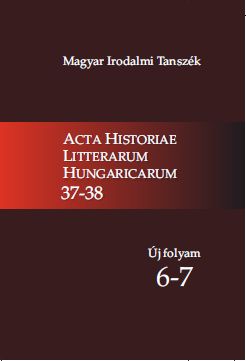Effects of the Medial Turn on the Lifestyle Articles by Júlia Jósika
Main Article Content
Abstract
In the second half of the 19th century journalism became the primary medium of Hungarian literary scene. It was a common practice for authors and editors to publish their texts first in the daily newspapers, weeklies or periodicals with the book‐form publication following later on – depending on the success. This way, the publishers were able to provide authors with publicity and feedback from the audience (readers’ letters, changes of subscribers etc.) without significant financial risk. By the grounds of these informations publishers could decide which groups of texts were worthy for a book with the hope of public success. Júlia Jósika – a Hungarian emigrée, who lived in Brussels in the 1850–1860’s – was the author of the first original Hungarian female conduct book titled Pályavezető [Mentor](1863). The book was written by request from publisher Gusztáv Heckenast, and it was partially composed from Júlia Jósika’s own articles published regularly in the magazine Nővilág [Women’s World] between 1857–1860. The conduct book contains some Nővilág‐articles without any change, some she wrote over or compiled from more than one of her texts, but there are also completely new chapters in Pályavezető. In my paper I examine the re‐interpretations of the texts which got out of their original context, with special regard to the target audience, history of publishing and the occasional political content. For the comparison between the two different media, I use the methods Wolf Kittler and George Bornstein regarding the materiality of the texts.

